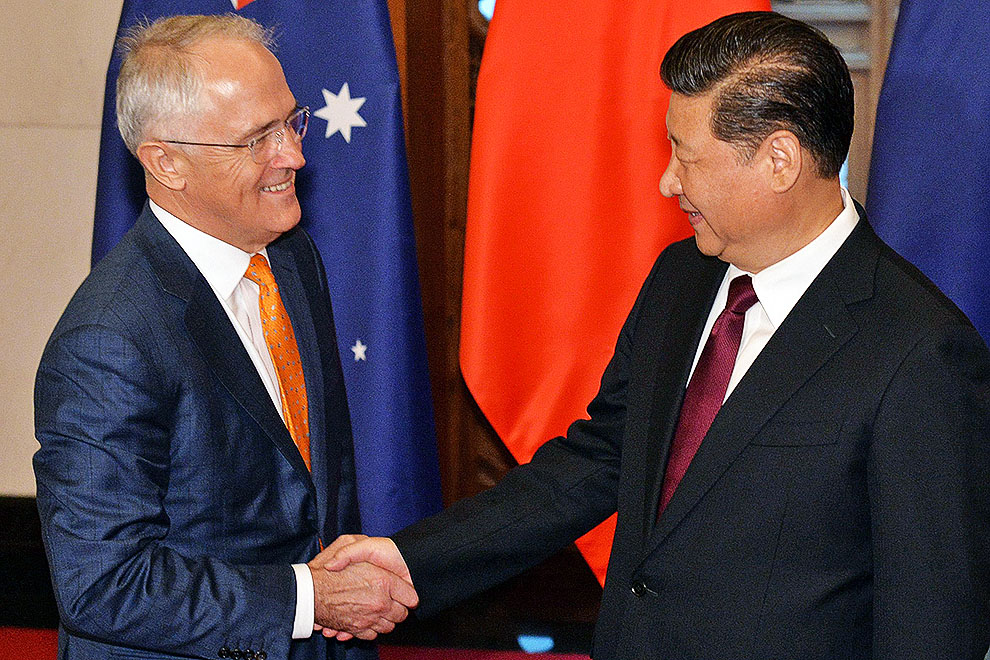On 4 June 2014 the Australian Broadcasting Corporation signed a landmark agreement with the Shanghai Media Group to establish a China-focused version of the ABC’s Australia Plus website. The date was sensitive. Exactly twenty-five years earlier a thousand or more students and workers were killed by forces of the People’s Liberation Army in and around Beijing’s Tiananmen Square. The anniversary passed without mention in China. The Tiananmen Massacre is one of those things the press is never allowed to mention.
The anniversary of the massacre was widely reported in Australia and ly. In the week leading up to the signing, it received generous coverage in the ABC’s English-language media. And yet the Chinese-language web pages of ABC International programming were conspicuously silent on this subject. That silence launched a new era for the ABC’s Chinese-language programming. “Your ABC” apparently no longer had room for general news, current affairs reporting or any commentary in Chinese likely to give offence to the Chinese Communist Party.
This shift in the ABC’s practice was exposed by research on Beijing’s growing control of offshore Chinese community newspapers, control exercised through the Central Propaganda Bureau’s media arm, China Radio International. That research found that on 4 June 2014 a majority of Australian Chinese-language newspapers loyally refrained from mentioning the anniversary. Logging onto ABC Chinese programming revealed that the ABC’s coverage was identical to the media bought out by China Radio International. There was no coverage of the anniversary.
Had the ABC yielded to Chinese demands for censorship when it signed the 4 June agreement?
The Australian media’s commitment to fair, honest and open reporting is vital for keeping markets informed, politicians honest, and the public in touch with current affairs – not least about China. China’s media responds to different imperatives. Newspapers, magazines, television stations and digital platforms operate at the discretion of the Central Propaganda Bureau and in the service of the government.
The Propaganda Bureau has a long reach, extending well beyond China’s border. In Hong Kong and Thailand, it has recently been involved in the abduction of five publishers associated with Hong Kong’s Mighty Current Publishing House. By closing down one publisher, Beijing succeeded in intimidating others: Hong Kong’s Open Publishing Company is reported to have told prominent liberal critic Yu Jie that it can no longer honour its agreement to publish his completed manuscript on China’s president Xi Jinping.
Beijing’s grip on the media in Hong Kong is replicated elsewhere. Reuters reports that China Radio International exercises substantial control over Chinese community media throughout North America. The same applies in Australia: Chinese-language news and commentary produced in Beijing is rebroadcast through commercial radio stations and other media in Australia that have been acquired by businesses acting on behalf of Beijing. Other voices are silenced. All up, according to the Reuters investigation, China Radio International has bought “at least thirty-three radio stations in fourteen countries.” In Australia one of the networks it influences is Tommy Jiang’s Austar Media, which has Chinese-language programming and newspapers in several capitals.
China Radio International prepackages its own content for placement in local media outlets, and excludes alternative news sources. It tolerates no criticism of the Chinese government in the Australian radio and press networks it controls. Chinese Australians are now being lectured, monitored and policed within Australia as never before, on instructions from Beijing.
The ABC used to offer a Chinese-language alternative. Over the years leading up to the signing of the ABC agreement with China, Radio Australia’s Chinese-language website carried a variety of news and commentary on its home page and in two drop-down sections, “Newsletter” and “China in Foreign Media” (my translations). Ten or more news items were uploaded each day in Chinese. In 2012 these included claims that Chinese industry did not own all of the intellectual property for the high-speed rail systems it was marketing abroad. In 2013 the website carried Hong Kong media reports about how president Xi Jinping’s anti-corruption campaign had failed to target top officials. Early in 2014, the website reported that Japanese fighter planes had challenged China’s recently declared air-defence zone in the China Sea, and drew attention to reports by Bloomberg and the New York Times on the unexplained wealth of China’s top Party leaders. It referred to newsworthy articles published by path-breaking journals in China, including Yanhuang Chunqiu, shut down by Beijing authorities shortly afterwards.
One of the last news reports to appear on the ABC Chinese site before the 4 June agreement forewarned of the perils of online media in China:
The New York Times reports that distinguishing fact from fiction on the internet is a challenging task anywhere in the world. In China the problem is especially acute because of the relative lack of reliable information, particularly in news touching on government. The Times reports that in recent years Chinese authorities have often published false information in order to conceal the truth from the public, resulting in the rapid spread of rumours. These arise because people are groping to know the truth. In light of official lies, coupled with rumours countering them, distinguishing fact from fiction and especially authenticating statements on the web has become more difficult than ever (my translation).
This prescient warning was all but the final peep out of the ABC’s web-based Chinese-language news service before it surrendered to the knife. Some months later, on the twenty-fifth anniversary of the massacre, the ABC Chinese-language site presented news articles on the revival of Confucian costume and on racism in Australian sport.
The new ABC China site was finally launched in Shanghai on 9 April 2015. By then, the ABC had closed its web-based Radio Australia Chinese service in favour of the new platform, based inside the Chinese firewall at australiaplus.cn. These parallel moves marked the end of all general news and current affairs on ABC Chinese-language platforms, both in China and in Australia.
This was not how it was meant to be. The CEO of ABC International, Lynley Marshall, explained at the time of signing that the 4 June Shanghai agreement was designed to “enable us to put the full range of Australia Network programming and content from other Australian media into China and for China to connect more closely with our media.” Yet since the launch of australiaplus.cn, listeners and readers connecting to ABC International’s Chinese-language services have been directed away from the ABC site in Australia to a domain in China that describes itself as an information “service tool” approved by the government of China. It does not claim to offer news or current affairs in Chinese, because it doesn’t. The new site’s content is largely confined to stories and advertisements covering culture, education, tourism and business opportunities in Australia.
Click on its Chinese-language connection to ABC Australia and there are no news or current affairs programs available in Chinese in Australia either. Australiaplus.cn not only fails to offer news and current affairs, it also supports China’s higher strategic purpose of eliminating reliable sources of news and information once broadcast through the ABC International Chinese service from Australia.
The China site is unique in the stable of variants of the ABC’s Australia Plus websites targeting Asian communities in their own languages. Australia Plus programming in Burmese, Khmer, Indonesian and Vietnamese carry general news and current affairs. The Chinese-language site was singled out for special treatment.
The question is, why?
One possible explanation is that China would periodically block ABC International news and current affairs programming in Chinese from entering Chinese airspace. As China was identified as ABC International’s target country, news blocked before hitting its target was presumably news wasted. Still, complying with China’s demand for news silence meant ignoring the other sixty million Chinese speakers outside China, in Southeast Asia, Singapore, Hong Kong, Taiwan and Australia itself.
Second, news and current affairs are expensive. The ABC has absorbed funding cuts that have flowed through to ABC International, but an ABC platform based in Shanghai is not affected by the prohibition applying to ABC advertising on programs broadcast from within Australia. The new China site carries advertisements for airlines, universities, schools and so on.
Third, market research doubtless indicated significant demand for information services of the kind that the Chinese version of Australia Plus could provide, assuming it was based in China, which in turn assumed it carried nothing that could alert censorship officers there.
Fourth, the ABC board was trying to secure landing rights in China around that time – the right to have ABC shown in hotel lobbies and airports and the like. Initially, this involved going through the well-connected guanxi impresario Sheri Yan. When Sheri Yan’s networks failed to land a breakthrough deal – she now languishes in a New York jail for allegedly bribing a senior UN official – the new ABC board turned to the Shanghai Media Group to secure a different deal. Something was perhaps better than nothing.
Whatever the explanation, the outcome is not something Australians can be proud of.
We can hardly blame the Chinese Communist leadership for trying to control media platforms at home and abroad. Leninist party organisations are programmed to mount deceptive public propaganda campaigns while operating clandestinely to seize and exercise control over independent agencies targeted for penetration.
Nor can Chinese-Australian media owners be held to account. They may have become rich on the revenue earned through sale of their local media assets to Chinese government–backed entities, but there is no law against that.
It is another matter when national public institutions – like the billion-dollar-a-year, taxpayer-funded ABC – endorse and encourage Beijing’s efforts to silence critical voices at home and abroad. Everyday compromises by our national institutions betray not just Chinese Australians, but the rest of us as well.
There is a larger problem still. In the absence of a national strategy for managing relations with China, we encourage our agencies and employees to do whatever it takes to engage with the Chinese market, even if this means surrendering the values we profess to uphold. Something is amiss at the level of national strategy when compromises that betray these values are celebrated as major national achievements.
The national broadcaster’s dealings with China signal to the world that our commitment to values and core interests is negotiable.
When I raised these concerns in an earlier version of this article in the Australian Financial Review last week, the ABC issued a strong statement taking issue with my argument. But rather than addressing the specific criticisms made in the article, the statement focused on points I didn’t make.
The broadcaster denied, for example, that the ABC entered into an agreement with the Chinese government to censor content; the article didn’t suggest that it did so. The ABC denied that it discontinued its Mandarin radio service to focus on australiaplus.cn; the article didn’t refer to the Mandarin radio service, which closed in 2013, but rather to events in 2014 when the ABC ceased to publish its online Chinese-language news service (its written, not spoken Chinese service, that is), shortly before opening australiaplus.cn. The ABC refuted the claim that australiaplus.cn has no links to other ABC news sites; but again, the article made no such claim.
It is widely acknowledged that foreign media seeking success in China must silence news and current affairs that might cause offence to the Party, especially news and commentary in the Chinese language. This is not something open to negotiation or spelled out in a contract. To the extent that australiaplus.cn is operating successfully in China as an Australian information platform, it is predicated on the ABC’s removing Chinese-language news and current affairs programming online.
The ABC response fails to address the specific claims made in the article, and the underlying claim that the operation of australiaplus.cn, including its links to ABC Australia, is conditional on the ABC’s removing all Chinese-language news content unfavourable to the Chinese Communist Party from its web pages. The ABC has not seen fit to do the same with other Asian-language services on its broader Australia Plus platform. •




